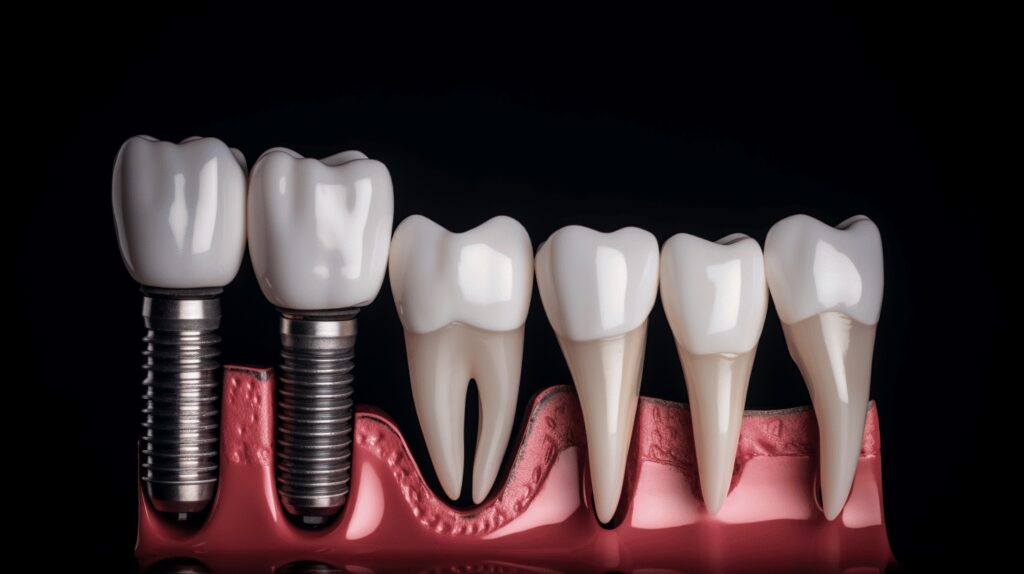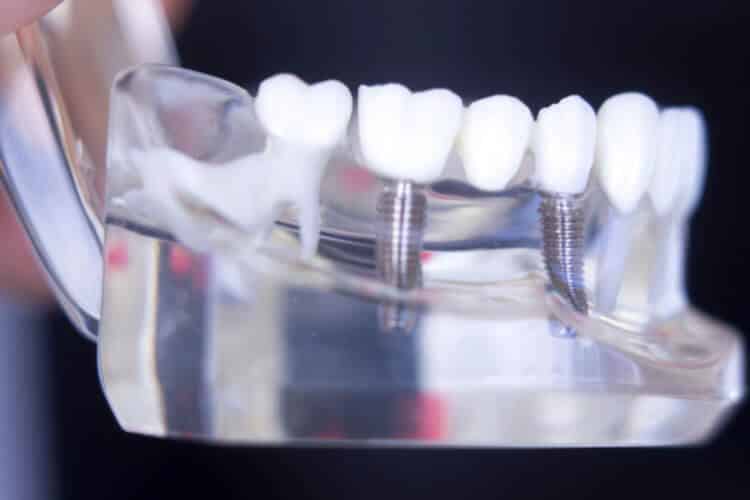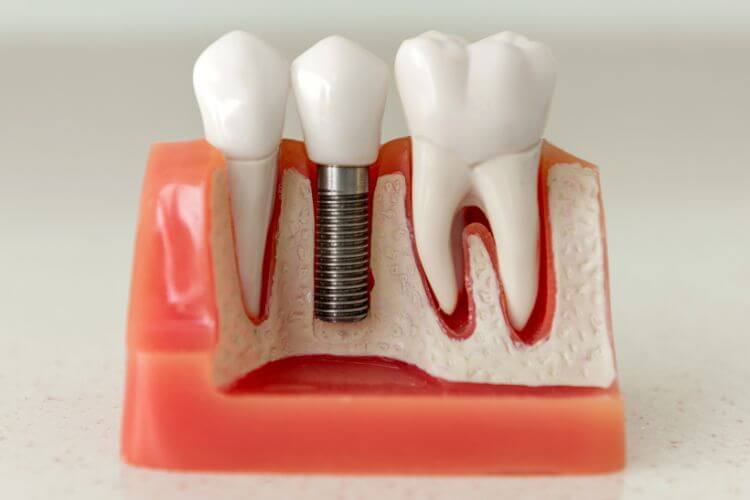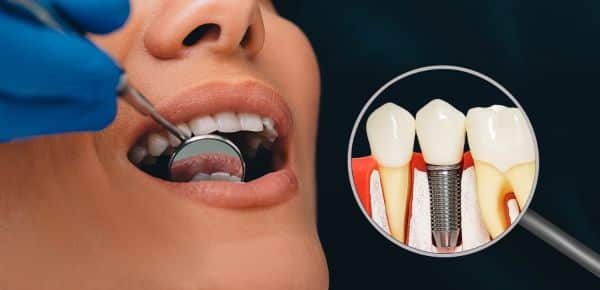Welcome to your ultimate guide on dental implants and dentures! We know that overcoming tooth loss and deciding the best dental route to take can be daunting. The choice between dental implants and dentures can significantly influence your confidence, lifestyle, and, not to forget – your smile!
But we’re here to help you make an informed decision for your unique needs and lifestyle. Every smile is different, and so is every method of dental restoration. This guide compares dental implants and dentures, understanding their procedures, analyzing their pros and cons, and highlighting critical factors you should consider.
Let’s take a bite-sized tour to help you replace lost teeth with confidence and grace. 🦷💫
Table of Contents
Understanding Dental Implants
Ever wondered why smiling confidently is such a big deal? A bright, radiant smile can light up a room and expresses our joy and happiness in the most beautiful way possible. However, losing a tooth or two as a result of disease or injury can rob us of our confidence to beam that magical, beaming smile. Thankfully, modern dental technology like dental implants can come to the rescue. In this discussion, we’ll explore what dental implants are, delve into the procedure of dental implant surgery, and finally shed some light on the pros and cons of dental implants.
What are Dental Implants?
Dental implants, in simple terms, are artificial replacements for the root portion of missing natural teeth. Generally made from medical-grade titanium, these implants bond with the jawbone to form a stable foundation for fixed or removable replacement teeth. The best part is, they are designed to look, feel, and function just like your natural teeth! So, no more holding back on smiling or fear of biting into your favorite apple because dental implants give you the freedom to enjoy life just the way you want.
Procedure of Dental Implant Surgery
The journey to getting dental implants is not a one-shot visit to the dentist. It involves a series of procedures spread out over a few months. Here’s a brief overview of what to expect:
- Initial Consultation: The dentist will conduct a comprehensive examination of your teeth and gums, and recommend suitable treatment options based on your condition.
- Preparation of Jawbone: If your jawbone is too thin or soft to accommodate an implant, a bone grafting procedure may be required. Next, your dentist places the dental implant post into the jawbone.
- Placement of Implants: The dentist will place the implant onto your jawbone through a minor surgical procedure.
- Osseointegration: This is the waiting period during which the jawbone heals and fuses with the implant to provide a reliable base for the new artificial tooth.
- Placing the Crown: On complete healing, your dentist will fit an artificial tooth or crown on the implant.
Pros and Cons of Dental Implants
While dental implants may seem magical, they come with their own set of pros and cons. One of the major advantages is their durability. If taken care of properly, they can last a lifetime. They also enhance facial aesthetics as they prevent bone loss which would otherwise cause premature wrinkling and a drawn, aged appearance.
On the flip side, dental implant procedures are not a quick fix and require several visits to the dentist. Also, just like any surgical procedure, they carry a risk of infection, nerve damage, or sinus problems. For an in-depth insight into the “Pros and Cons of Dental Implants”, you can check out this comprehensive guide.
We hope this discussion helps you understand dental implants better and guides you in choosing the best oral health solutions for you. Remember, it’s not just about wearing a smile; it’s about maintaining complete oral health and functionality to live life to the fullest! So, keep shining, and most importantly, keep smiling! 😄
Understanding Dentures
For many, the word “dentures” might bring about images of grandparents and outdated perception of tooth repair. However, with the advancements in dental technology, dentures aren’t what they used to be. In this section, we’ll aim to shed light on what dentures actually are, go through the diverse types available today, and highlight their potential pros and cons. Let’s dive right into it. 😄
What are Dentures?
Dentures are artificial replacements for missing teeth, which can be taken out and put back into your mouth. While they won’t feel exactly the same as one’s natural teeth (at first), today’s dentures are natural looking and more comfortable than ever. From filling out your facial profile to improving your ability to eat and speak, they play a crucial role in improving a person’s quality of life.
Types of Dentures
There are several types of dentures out there, each designed to address specific needs:
- Complete Dentures: These are for people who have lost all their teeth. They can be either “conventional” or “immediate.”
- Partial Dentures: These are for people who have lost only some of their teeth.
- Implant-Supported Dentures: These are attached to implants in the mouth for support and are excellent for those who lack the bone density in their jaws to install traditional dentures.
- Snap-In Dentures: These are an advanced type of denture that utilizes implants to remain secured in the mouth, but unlike implant-supported dentures, they can be removed for cleaning and care.
Pros and Cons of Dentures
As with most things in life, dentures also come with their own set of strengths and weaknesses.
Pros
- Dentures can help restore your smile and facial appearance.
- They can improve your ability to eat and speak.
- Today’s dentures are designed to be comfortable and functional.
- They’re a cost-effective solution to the problem of missing teeth.
Cons
- Dentures require daily cleaning.
- They should be removed every night, which some people may find inconvenient.
- There can be an initial feeling of discomfort or awkwardness.
- Chewing with dentures might require some getting used to.
Become an informed decision-maker by understanding everything about dentures. Weigh their pros and cons, and think about the type that suits your specific dental needs the most. With the right choice, you’ll be flashing your confident smile everywhere you go! 😁
So, it’s evident that dentures have evolved over the years to become a reliable, flexible, and comfortable solution for those with missing teeth. While dentures can require some adjustment, they offer numerous benefits that restore not just your smile, but also your self-esteem and quality of life. Let’s put those dental anxieties to rest, because modern dentures are here to make your life so much better.
Comparative Analysis: Dental Implants vs. Dentures
We’re often faced with multiple options when considering solutions for missing teeth and knowing the pros and cons of each can make the decision-making process much more manageable. So here we are today, taking a close look at two popular tooth replacement options: Dental Implants and Dentures.
Durability and Longevity
Dental implants are known for their superior durability and longevity. They’re considered a permanent solution because they’re surgically inserted into the jawbone, serving as artificial tooth roots. In stark contrast, dentures are removable and generally don’t last as long. They typically need replacement every 5 to 8 years.
Aesthetic Appearance
Both dental implants and dentures have come a long way in terms of aesthetics. Modern dentures are more natural-looking than their predecessors, but dental implants typically edge out in this category. Dental implants mimic the look and function of natural teeth more closely due to their structure and design.
Comfort and Adaptability
When it comes to comfort and adaptability, dental implants again take the lead. Since they’re fused to your jawbone, one experiences little to no discomfort, and it adapts seamlessly with the individual’s oral condition. On the contrary, dentures may require regular adjustments for fitting and can sometimes cause discomfort while eating or speaking.
Buyer Considerations: Cost and Maintenance
Choosing between dental implants and dentures often boils down to cost and maintenance. Dental implants can be a bit pricier upfront, but their low maintenance and longevity often justify the investment. Dentures, however, are generally more affordable initially but may require more frequent replacement and care.
Impact on Natural Teeth and Gums
In terms of impact on natural teeth and gums, dental implants have a slight advantage. Since they’re inserted into the jawbone, they do not impact adjacent teeth. Dentures, however, may sometimes cause irritation and discomfort to gums, especially when not fitted correctly.
Procedure Timelines
Last but not least, procedure timelines vary for dental implants and dentures. While implants may require multiple sessions and recovery time, dentures can often be fitted in a few appointments.
Choosing between dental implants and dentures largely depends on your specific needs, circumstances, and dentist’s recommendations. If you’re curious to learn more about dental implants, check out our Benefits of Dental Implants, a comprehensive guide that delves deeper into their advantages. Remember, the goal is to restore your smile and enhance your oral health, and both dental implants and dentures can effectively address these needs.
Making the Right Choice for You: Key Factors to Consider
We all want to make the right choices to improve our quality of life, be it in our careers, education, relationships, or health. Particularly when it comes to healthcare, we know how important it is to make informed decisions. However, we understand it’s not always easy. That’s why we’ve compiled a list of key factors that you should consider must-haves to steer you in the right path. Let’s get started! 😃
Your Oral Health Status
First off, you need to assess your oral health status. Different dental issues require different dental treatments – and sometimes the same problem can have several possible solutions!
- Are you suffering from tooth decay or gum disease? 😷
- Do you experience frequent discomfort or pain in your mouth? 🤒
- Are you happy with how your teeth look? 🤔
Answering these questions will give you a starting point for determining what dental procedure may be best for you.
Your Budget
So, you’ve identified your problem, and now you need the solution. But health treatments don’t come cheap and dental care is no different! 💸
Factoring in your budget is a big deal when deciding on a dental procedure. It directly affects the type and quality of treatment you can get.
Remember: Cheaper isn’t always better. Investing in good quality dental care now can prevent more expensive and complicated treatments down the line.
Your Lifestyle
How does your lifestyle fit into all of this, you ask? 🤷♀️
Well, different dental procedures have varying recovery times and maintenance routines. Some may demand significant changes to your regular habits.
If you’re someone with a super busy schedule, you might want to opt for a more low-maintenance solution. Alternatively, those who have the luxury of a more flexible schedule might not mind giving extra time to their dental care.
Expert Consultation
The last, but arguably the most important, factor to consider is expert consultation. It’s vital to leverage the expertise of dental professionals for personalized advice. After all, they spent years perfecting their craft for a reason, right? 👩⚕️👨⚕️
Remember: Self-diagnosis and treatment can lead to more harm than good. Rely on trained professionals.
Now that we’ve outlined the critical elements when making dental care decisions, you can confidently move forward.
Remember, the choice is yours. The decision-making process might seem overwhelming – but we’re here for you. Consider these factors, consult experts, and you’ll surely make the best decision for your oral health. 😃👍
Conclusion
Navigating the complexities of dental health and the many options available can be challenging. Whether you’re considering dental implants or dentures, remember that the best choice will always be the one that suits your unique needs, lifestyle, and budget. Both options have their distinct advantages, and no solution fits every situation.
At the end of the day, remember that your smile is one of your most valuable assets. So, it’s absolutely essential to take care of it. If you’re still unsure about what’s right for you, why not consult a professional?
At Wilshire Smile Studio, we are dedicated to helping you put your best smile forward. 👩⚕️👨⚕️With our team of experienced professionals and state-of-the-art technology, we ensure personalized and exceptional dental care for our patients.
From dental implants to various denture options, preventative dentistry, and even emergency dental care, you can find it all under one roof! We aim to make your dental care journey comfortable, affordable, and most importantly, effective for you. 😁💖
We believe everyone deserves their perfect smile 😊 so why wait? Start your journey towards a healthy and beautiful smile with us today! For more information about our services, please call us at 323-DENTIST (323-336-8478). We’re here for your smile, one tooth at a time!
So, whether it’s dental implants or dentures, make your choice, and keep that smile bright and beautiful!
Frequently Asked Questions
- What is the difference between dental implants and dentures?Dental implants are permanent replacements for missing teeth that are surgically placed in the jawbone, while dentures are removable prosthetic devices that replace missing teeth and surrounding tissues.
- Which option, dental implants or dentures, is more suitable for me?The suitability of dental implants or dentures depends on various factors such as oral health, bone density, budget, and personal preferences. It is best to consult with a dentist who can evaluate your specific needs and recommend the most suitable option.
- Are dental implants more expensive than dentures?Yes, dental implants are generally more expensive than dentures. However, dental implants offer better long-term benefits and durability compared to dentures, making them a worthwhile investment for many individuals.
- How long do dental implants and dentures last?Dental implants have the potential to last a lifetime with proper care and maintenance, while dentures typically have a lifespan of 5 to 10 years and may require adjustments or replacements over time.
- Do dental implants require any special care?Dental implants require regular oral hygiene practices, such as brushing and flossing, just like natural teeth. Additionally, regular dental check-ups are necessary to ensure the health and longevity of the dental implants.









